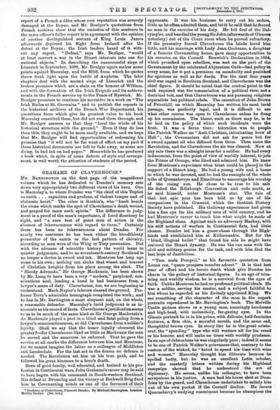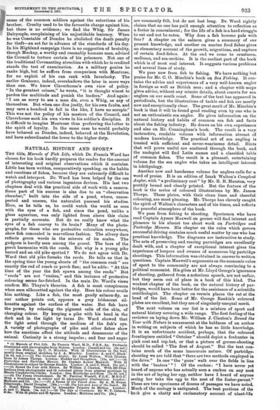GRAHAME OF CLAVERHOUSE,
Ma. BARRINGTON on the first page of the magnificent volume which he has dedicated to Dundee's memory sets down very appropriately two different views of his hero. One is Macaulay's, to whom Dundee was " the chief of this Tophet on earth . . . rapacious and profane, of violent temper and of obdurate heart." The other is Ruskin's, who "knelt beside the stone which marks the spot of Claverhouse's death wound, and prayed for more such spirits." The difference in judg- ment is a proof of the man's importance, if Lord Rosebery be right, and " a sure test of great men of action is the absence of lukewarmness with regard to them." Certainly there has been no lukewarmness about Dundee. For nearly two centuries he has been either the bloodthirsty persecutor of the saints or the last pattern of chivalry, according as men were of the Whig or Tory persuasion. But with the advance of scientific history the world leans to quieter judgments, and to us seventeenth-century Scotland is no longer a device in sword and ink. Montrose has long ago come to his own ; nothing can shake that wisest and bravest of Christian knights from his place among the elect. The
Bloody Advocate," Sir George Mackenzie, has been shown by Mr. Lang to have been a very " modern," perplexed, con- scientious soul, lending a hand in bad businesses from a lawyer's sense of duty. Claverhouse, too, we are beginning to understand. Mark Napier's labours cleared the ground. Pro- fessor Terry's admirable monograph completed the work ; and he has in Mr. Barrington a most eloquent and, on the whole, a reasonable defender. Macaulay's lurid judgment is as in- accurate as his record of facts. Claverhouse's justification seems to us to be much of the same kind as Sir George Mackenzie's. As Mackenzie played a part in a blind and fatal policy from a lawyer's conscientiousness, so did C$werhouse from a soldier's loyalty. Shall we say that the lesser loyalty obscured the greater P—for Claverhouse liked as little as Mackenzie the men be served and the measures he enforced. That he gave the service at all marks the difference between him and Montrose, for we cannot imagine the latter as a colleague of Middleton and Lauderdale. For the last act in the drama no defence is needed. The Revolution set him on his true path, and he followed his great kinsman to a hero's death.
Born of good family, well educated, and trained to his pro- fession in Continental wars, John Grahame's career may be said to have begun with his command in South-western Scotland. His defeat at Drumclog and the victory at Bothwell Brig fixed him in Covenanting minds as one of the foremost of their
• Grahame of Clarerhonse, Viscount Dundee. By Michael Barrington. London Martin Seeker. L300. net.] opponents. It was his business to carry out his orders, little as he often admired them, and let it be said that he feared no man in the exercise of his duty. He fell foul of the Dal. rymples, and bundled the young Sir John (afterwards of Glencoe notoriety) out of the Court room when he proved refractory. If the peasantry feared Claverhouse the lairds loved him little, and his marriage with Lady Jean Cochrane, a daughter of a famous Covenanting house, gave many opportunities to his enemies on the Council. Renwick's Declaration in 1684, which preached open rebellion, was met on the part of the Government by the celebrated Abjuration Oath—bad policy in every sense, for it put a premium on mendacity and punished for opinions as well as for deeds. For the next four years civil war raged in Southern Scotland, and Claverhouse was the chief figure. It should be noted that the central point in the oath required was the renunciation of a political view. not a doctrinal test, and that Claverhouse was not pursuing religious separatists but political rebels. The execution of John Brown of Priesthill, on which Macaulay has written his most lurid passage, was perfectly legal, and it is difficult to see what other course was open to Claverhouse unless he flung up his commission. The blame, such as there may be, is to be laid on the policy of which such incidents were the fruit. It was a fierce time toleration was to people like Patrick Walker an "Anti-Christian, intoxicating brew of Hell " ; the Covenanters did not ask for peace but for a sword against all who differed from them. Then came the Revolution, and for Claverhouse the air was cleared. Now at any rate there was a straight issue for a soldier. He had every inducement, from the point of view of worldly interest, to join the Prince of Orange, who liked and admired him. He knew from Montrose's experience what trust could be placed in the support of a Stuart king. He had a young wife and a home to which he was devoted, and he had the example of the whole tribe of Queensberrys and Hamiltons to encourage his worship of the rising sun. He chose to be true to his salt He defied the Edinburgh Convention and rode north, at he said himself, under Montrose's star. The tale of that last epic year has been told us by one of his companions in the Graneeid, which the Scottish History Society have published. His Galloway experiences had given him a fine eye for the military uses of wild country, and he had Montrose's career to teach him what might be made of the Highland clans. Against such an adversary Mackay, with his stiff notions of warfare in Continental flats, bad little chance. Dundee led him a goose-chase through the High- lands and annihilated him at Killiecrankie. But for the "blind, illogical bullet" that found his side he might have restored the Stuart dynasty. He was the one man with the civil and military genius for the task, and with him died the last hope of Jacobitism.
"Tam mala Pompeii," as his favourite quotation from Lucan ran, " quam prospera mundus adoret." It is that last year of effort and his heroic death which give Dundee his charm in the gallery of historical figures. In an age of trim- ming and worldly wisdom be is a survival from the ages of faith. Unlike Montrose he had no profound political ideals. He was a soldier, serving his master, and a subject faithful to him whom he regarded as his divinely appointed King. We see something of the character of the man in the superb portraits reproduced in Mr. Barring-ton's book. The Melville Castle picture shows us a young man, amazingly handsome and high-bred, with melancholy, far-gazing eyes. In the Glamis portrait he is in his prime, with delicate, half-feminine features, a firm chin, a scornful mouth, and the same sad, thoughtful brown eyes. In every line he is the great aristo- crat, the " spending " type who will venture all for his creed or his honour, and will make no truce with worldly prudence. In an age of debauc bees he was singularly pure ; indeed it seems to be one of Patrick Walker's grievances that, contrary to the custom of the wicked, he " hated to spend his time with wine and women." Macaulay thought him illiterate because he spelled badly, but he was an excellent Latin scholar, and the masterly letters written during his Highland campaign showed that be understood the art of diplomacy. He seems, unlike his colleague, to have been scrupulous in his justice. A man had his horse shot at Dum- fries by the guard, and Claverhouse undertakes to satisfy him out of his own pocket if the Council decline. He incurs Queensberry's undying resentment because he champions the !cause of the common soldiers against the extortions of his brother. Cruelty used to be the favourite charge against him, but there is no evidence; we find the Whig, Sir James Dalrymple, complaining of his unjustifiable leniency. When be was Constable of Dundee be abolished the death penalty for theft—an act far in advance of the standards of his day. In his Highland campaign there is no suggestion of brutality, though Mackay, a worthy and resonably humane man, advised the Council to torture certain of his prisoners. Not one of the traditional Covenanting atrocities with which he is credited stands the test of examination. As a military genius he ranks high, but he suffers from comparison with Montrose, for no exploit of his can rank with Inverlochy. The earlier Grahame, indeed, overshadows the later in more ways than one. We know Claverhouse's own view of policy. "In the greatest crimes," he wrote, "it is thought wisest to pardon the multitude and punish the leaders." And again: "I am as sorry to see a man die, even a Whig, as any of themselves. But when one dies justly, for his own faults, and may save a hundred to fall in the like, I have no scruple!' This was not the policy of his masters of the Council, and Claverhouse sank his own views in his soldier's discipline. It is difficult to imagine Montrose thus preferring the 1 etter to the spirit of loyalty. In the same case he would probably have behaved as Dundee, indeed, behaved at the Revolution, and have subordinated the lower to the higher duty.



































































 Previous page
Previous page